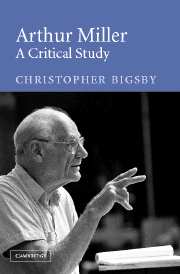Book contents
- Frontmatter
- Contents
- Acknowledgements
- Note on the text
- Introduction
- 1 The Michigan plays
- 2 The Golden Years, The Half-Bridge, Boro Hall Nocturne
- 3 The radio plays
- 4 The Man Who Had All the Luck
- 5 Focus
- 6 All My Sons
- 7 Death of a Salesman
- 8 Arthur Miller: time-traveller
- 9 An Enemy of the People
- 10 The Crucible
- 11 A Memory of Two Mondays
- 12 A View from the Bridge
- 13 Tragedy
- 14 The Misfits
- 15 After the Fall
- 16 Incident at Vichy
- 17 The Price
- 18 The Creation of the World and Other Business
- 19 The Archbishop's Ceiling
- 20 Playing for Time
- 21 The shearing point
- 22 The American Clock
- 23 The one-act plays: Two-Way Mirror, and Danger: Memory!
- 24 The Ride Down Mount Morgan
- 25 The Last Yankee
- 26 Broken Glass
- 27 Mr Peters' Connections
- 28 Resurrection Blues
- 29 Finishing the Picture
- 30 Fiction
- 31 Arthur Miller as a Jewish writer
- Notes
- Index
23 - The one-act plays: Two-Way Mirror, and Danger: Memory!
Published online by Cambridge University Press: 16 November 2009
- Frontmatter
- Contents
- Acknowledgements
- Note on the text
- Introduction
- 1 The Michigan plays
- 2 The Golden Years, The Half-Bridge, Boro Hall Nocturne
- 3 The radio plays
- 4 The Man Who Had All the Luck
- 5 Focus
- 6 All My Sons
- 7 Death of a Salesman
- 8 Arthur Miller: time-traveller
- 9 An Enemy of the People
- 10 The Crucible
- 11 A Memory of Two Mondays
- 12 A View from the Bridge
- 13 Tragedy
- 14 The Misfits
- 15 After the Fall
- 16 Incident at Vichy
- 17 The Price
- 18 The Creation of the World and Other Business
- 19 The Archbishop's Ceiling
- 20 Playing for Time
- 21 The shearing point
- 22 The American Clock
- 23 The one-act plays: Two-Way Mirror, and Danger: Memory!
- 24 The Ride Down Mount Morgan
- 25 The Last Yankee
- 26 Broken Glass
- 27 Mr Peters' Connections
- 28 Resurrection Blues
- 29 Finishing the Picture
- 30 Fiction
- 31 Arthur Miller as a Jewish writer
- Notes
- Index
Summary
Miller opened Two by A.M. at the Long Wharf Theatre in New Haven in 1982. It was less than a triumph. For its British publication I proposed Two-Way Mirror, to reflect, if that is the right word, the fluctuating realities within the plays, the change of perspective as a two-way mirror, with a simple alteration of lighting, turns from clear glass to mirror, from a view of the other to a view of the self. The plays, which can be performed separately or, if together, in any order (at the Young Vic they alternated), showed the extent to which the problematic nature of the real had moved to the centre of his concern. Consider the note that he wrote for the published version of Elegy for a Lady, one part of the diptych which is Two-Way Mirror:
It isn't always clear exactly where one stands in psychic space when grief passes up through the body into the mind. To be at once the observer and observed is a split awareness that most people know; but what of the grieved-for stranger, the other who is ‘not-me’? – Doesn't it sometimes seem as though he or she is not merely outside oneself but also within and seeing outward through one's own eyes at the same time that he or she is being seen?
There is an anguish, based on desire impossible to realize, that is so unrequited, and therefore so intense, that it tends to fuse all people into one person in a so-to-speak spectral unity, a personification which seems to reflect and clarify these longings and may even reply to them when in the ordinary world of ‘I’ and ‘You’ they cannot even be spoken aloud.[…]
- Type
- Chapter
- Information
- Arthur MillerA Critical Study, pp. 352 - 365Publisher: Cambridge University PressPrint publication year: 2004



